Key takeaways:
- Telecommunications technology has drastically changed communication, emphasizing the need for businesses to adapt to rapid advancements.
- Regular telecom audits can identify inefficiencies, prevent billing errors, and enhance financial performance while ensuring compliance with regulations.
- Challenges during audits include complex service agreements, system integration issues, and fostering a culture of transparency among team members.
- The future of telecom auditing will leverage AI and real-time monitoring, transforming the process into a proactive model focused on innovation and collaboration.
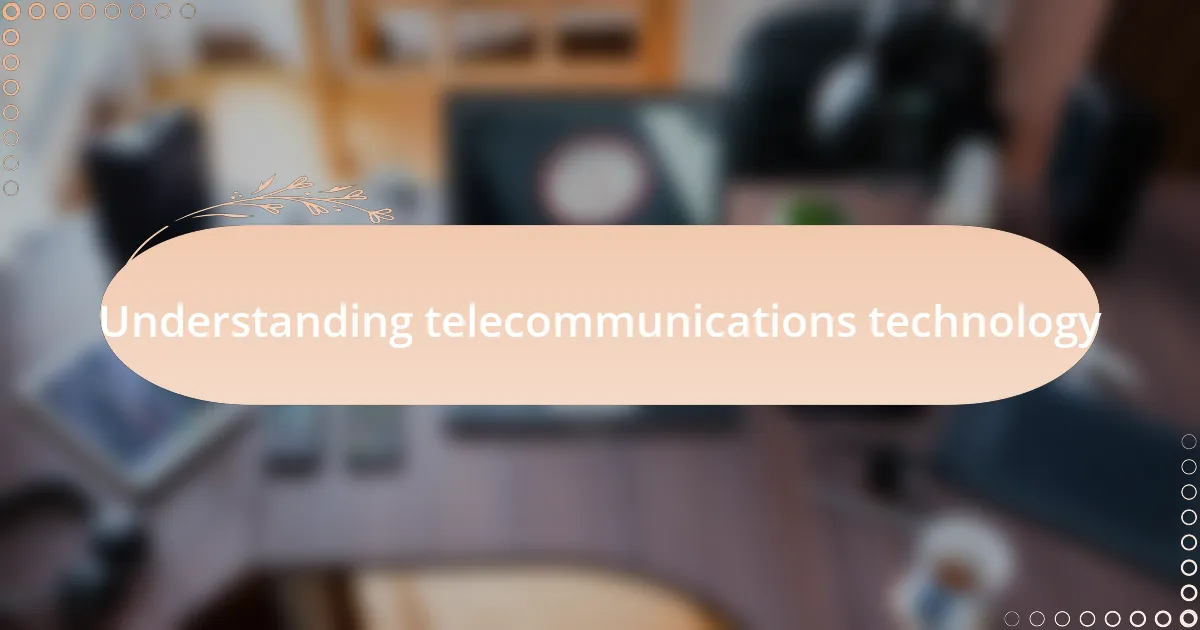
Understanding telecommunications technology
Telecommunications technology has fundamentally transformed the way we connect with one another. I remember the first time I experienced a video call; it felt like stepping into the future. The ability to communicate instantly, regardless of distance, really highlights the impact of advancements in this field.
Diving deeper, I can’t help but marvel at the intricate systems that support our daily interactions. Have you ever thought about how countless satellites and fiber-optic cables work harmoniously to deliver that crystal-clear signal we often take for granted? My experience during telecom audits truly opened my eyes to the complexity involved, from the equipment used to the protocols that ensure data is transmitted efficiently and securely.
Moreover, I’ve noticed how critical understanding this technology is for businesses today. With the rapid evolution of mobile networks and maturing IoT devices, companies must adapt quickly or risk falling behind. It’s exhilarating yet daunting; how do we keep pace with such rapid change? For me, each challenge is also an opportunity to learn and improve our communication landscapes.
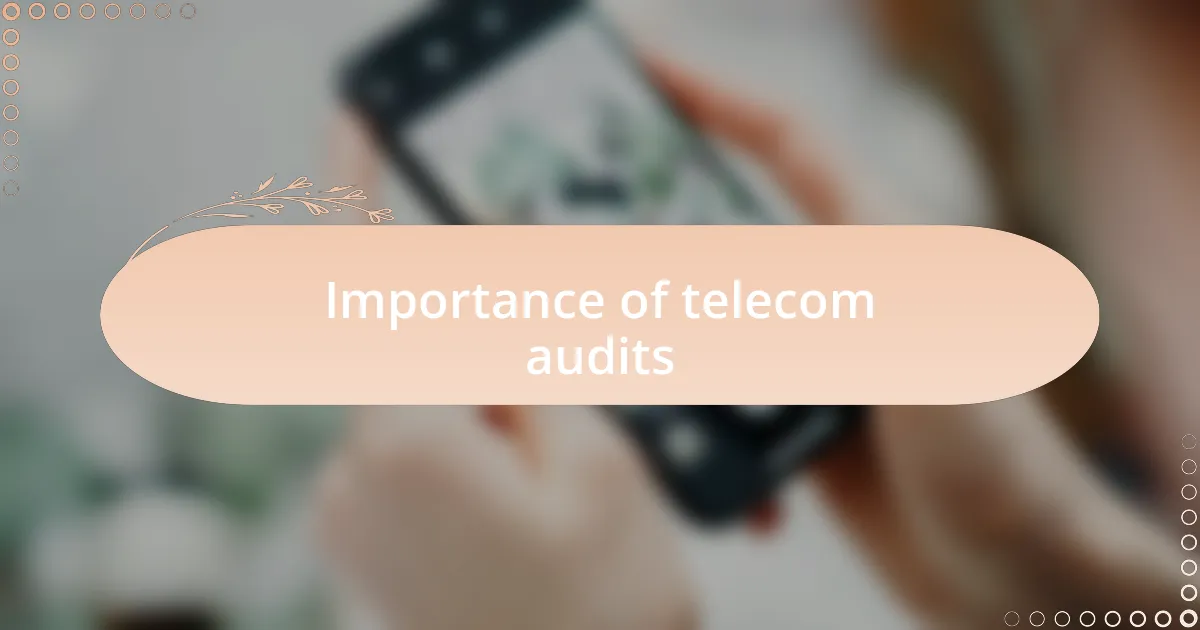
Importance of telecom audits
Telecom audits serve as a crucial checkpoint in maintaining the integrity of communication networks. I’ve found that these audits not only reveal areas for improvement but also highlight the strengths in a system that might otherwise go unnoticed. Have you ever pondered how a simple error in billing or service configuration can ripple across an organization? It’s fascinating to see how meticulous reviews can prevent such issues.
During my time conducting these audits, I’ve witnessed the significant cost savings that come from identifying inefficiencies. Just last month, I discovered that a company was overpaying for redundant services. This experience reinforced my belief that regular audits can dramatically boost financial performance while ensuring that technology assets are utilized to their full potential.
Furthermore, the ever-evolving nature of telecommunications technology heightens the importance of these assessments. As new technologies emerge, it’s vital to ensure compliance with regulations and best practices. Reflecting on my own audits, I’ve seen firsthand how critical it is to adapt and refine processes to align with advancements in the field, ultimately securing a competitive edge for organizations.
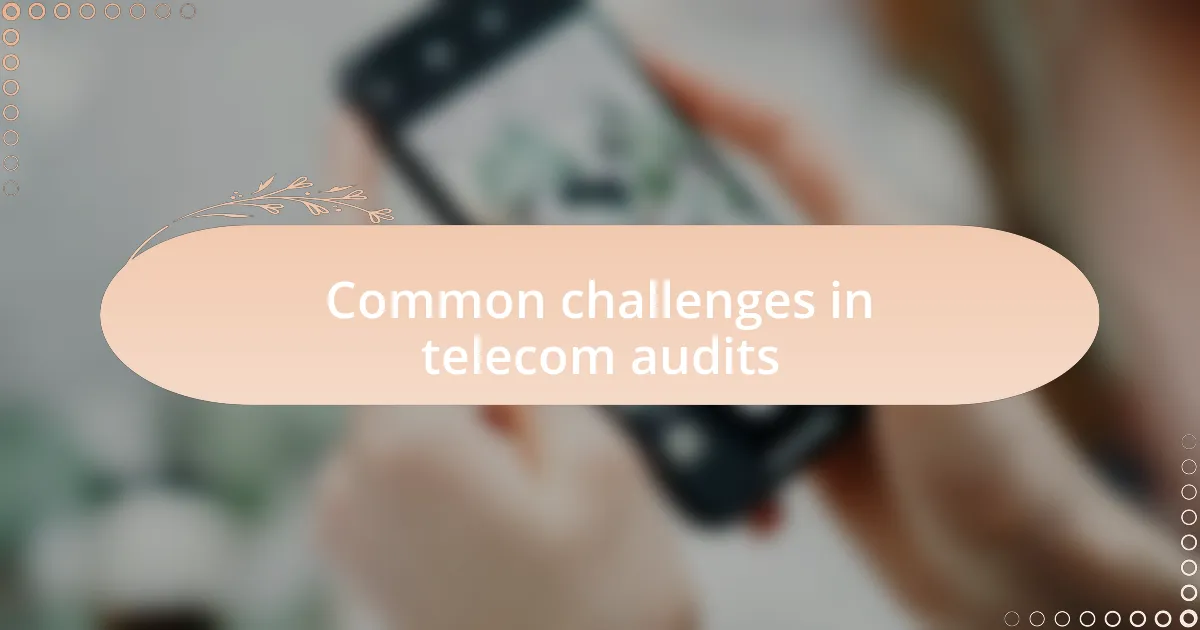
Common challenges in telecom audits
One of the most common challenges I face during telecom audits is the sheer complexity of service agreements and the fine print buried within them. I vividly recall a situation where a client was locked into a long-term contract that included hidden fees for data overages. It made me wonder how many businesses might unknowingly suffer the same fate, simply because they lack the time or expertise to dissect these documents.
Another hurdle often encountered is the integration of various systems and technologies. I remember a case where mismatched software led to discrepancies in billing data, which resulted in numerous hours spent reconciling accounts. Isn’t it astonishing how technology, intended to simplify processes, can sometimes be the source of confusion and frustration?
Additionally, the human element cannot be overlooked. During one audit, I noticed that some team members were hesitant to share information, fearing repercussions for past errors. This atmosphere can lead to a lack of transparency, making it challenging to paint an accurate picture of the telecom environment. How can we foster an open culture where employees feel safe discussing issues rather than hiding them away? These challenges, while daunting, serve as valuable learning opportunities to improve future audits.

Tools for effective telecom audits
The right tools play a pivotal role in navigating the complexities of telecom audits. For example, I remember using specialized software to analyze billing data during a recent audit. This tool not only streamlined the process but also revealed discrepancies I might have missed otherwise. How often do we rely on our instincts, only to find that technology can shed light on the hidden intricacies of our accounts?
Additionally, inventory management tools are invaluable for keeping track of devices and their associated costs. I encountered a situation where an audit revealed several unaccounted devices that were still being billed to the client. It was frustrating to think how these financial leaks could have been avoided with better tracking. Isn’t it surprising how something as straightforward as inventory can make or break an audit’s success?
Moreover, communication tools facilitate collaboration across teams, ensuring every stakeholder is on the same page. During an audit, I used project management software to gather input from various departments, which synthesized their feedback into actionable insights. Reflecting on that experience, I realized that having an open line of communication can transform the entire audit process, turning what once felt overwhelming into a manageable, even enlightening experience.
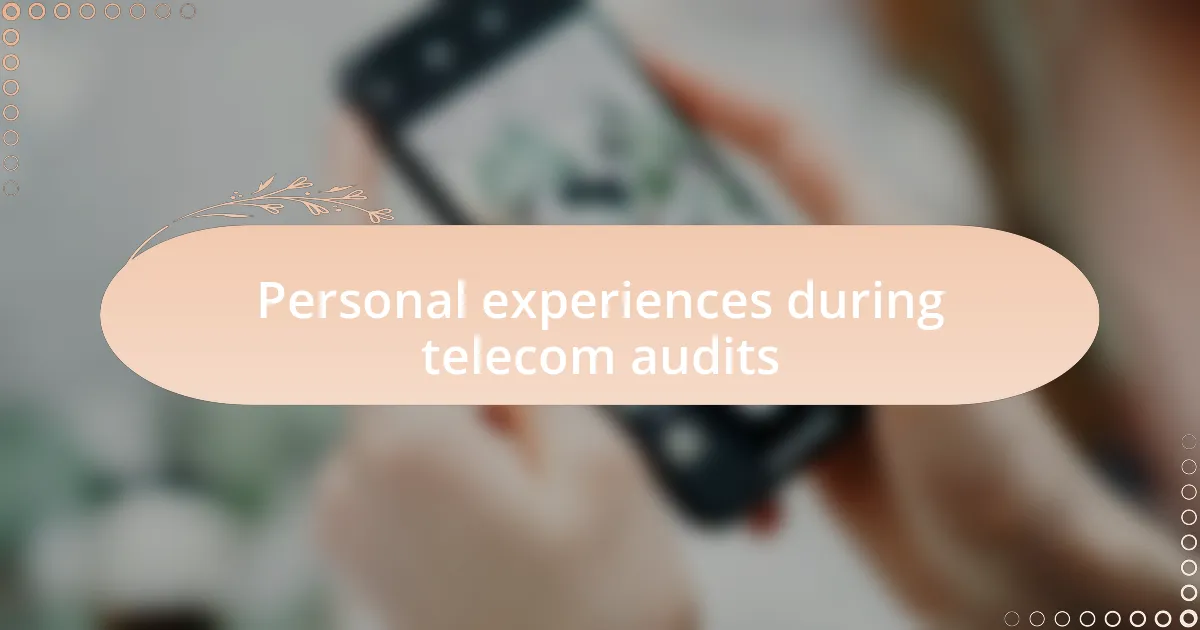
Personal experiences during telecom audits
While going through a telecom audit, I distinctly remember feeling a mix of excitement and trepidation. One particular instance stands out when I discovered a billing error that had gone unnoticed for months. The moment I found that discrepancy was electrifying; it felt as if I was unearthing a treasure hidden in plain sight. How often do we overlook details that could significantly impact our budgets?
In another audit, I had the chance to engage directly with the client’s team. It was fascinating to see their reactions when I presented audit findings that illustrated inefficiencies in their service usage. Their initial skepticism shifted to genuine concern as we delved into the implications of those findings. That experience made me realize the power of open dialogue in audits—how it can bridge gaps in understanding and lead to profound changes.
I also recall a challenging day when I had to reconcile data from various sources. The sheer amount of information was daunting, and at times, I felt overwhelmed. However, as I meticulously pieced the data together, a sense of accomplishment washed over me. Isn’t it incredible how, with every challenge, we often find a deeper understanding of our entire system?

Lessons learned from telecom audits
Throughout my experiences with telecom audits, I’ve learned that attention to detail is crucial. There was a moment when I overlooked a seemingly minor charge, but it led to a larger revelation about unapproved expenses. It struck me how vital it is to remain vigilant; even small discrepancies can snowball into significant financial implications. Isn’t it curious how our focus can shift, sometimes missing the forest for the trees?
Another lesson came from collaborating with diverse teams during audits. I remember vividly one audit where the IT department was initially resistant to my findings. However, after I connected the dots between their inefficiencies and potential cost savings, their resistance transformed into enthusiasm. This taught me that fostering a collaborative environment can lead to meaningful changes—a powerful reminder that communication is just as important as the audit itself.
Lastly, I realized the importance of adaptability in our approach. There were times when the data didn’t align as expected, making me rethink my assumptions. This flexibility is invaluable; it encourages us to explore alternative solutions and insights we might have otherwise missed. How often do we adhere too tightly to our initial perspectives, dismissing other avenues that could lead to improvement?
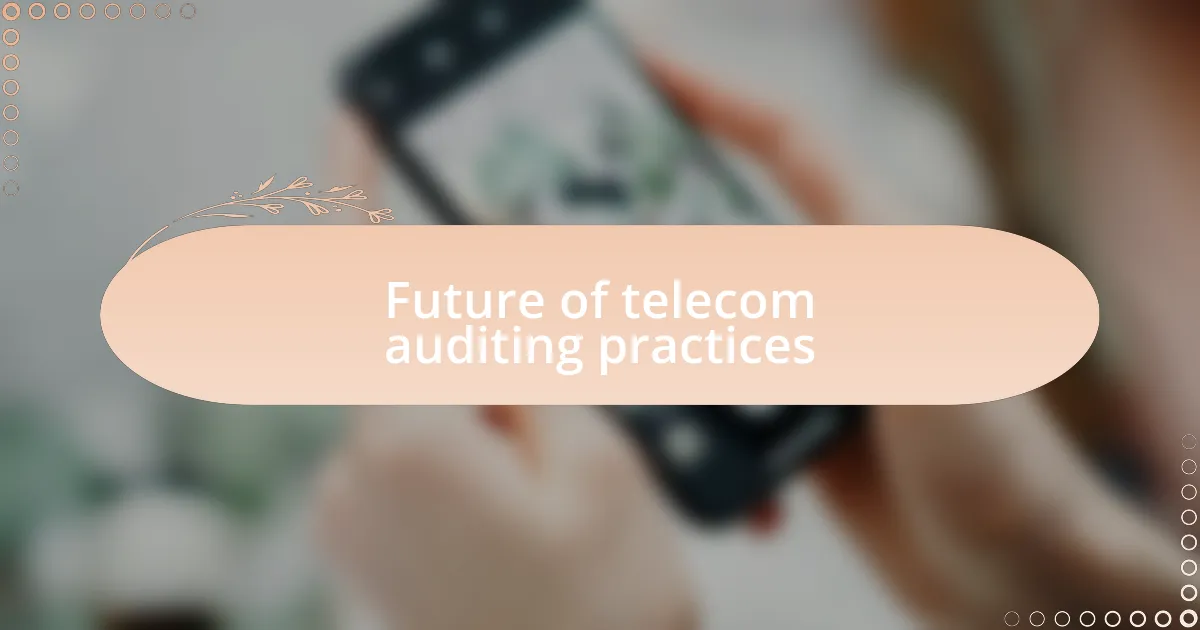
Future of telecom auditing practices
The future of telecom auditing practices is set to embrace advanced technologies such as artificial intelligence and machine learning. I remember a time when analyzing vast datasets was a labor-intensive process, often leading to potential human error. With these technologies, I foresee a more automated approach that sifts through data with precision, allowing auditors to focus on strategic analysis rather than mere number crunching.
As we shift towards a more proactive auditing model, I anticipate a greater integration of real-time monitoring tools. In one of my past audits, I spent weeks uncovering discrepancies that could have easily been caught with ongoing oversight. Imagine having a system in place that continuously alerts us to anomalies as they occur. This shift could transform our role from reactive troubleshooters to proactive guardians of financial integrity in telecommunications.
Looking ahead, I also believe collaboration will play an even bigger role in refining auditing processes. During one audit, a simple brainstorming session with both finance and technical teams led to innovative solutions most of us hadn’t considered. Isn’t it fascinating how combining perspectives can unveil efficiencies we never knew existed? This collaborative spirit will be essential as the industry navigates complexities and strives for more holistic auditing frameworks.